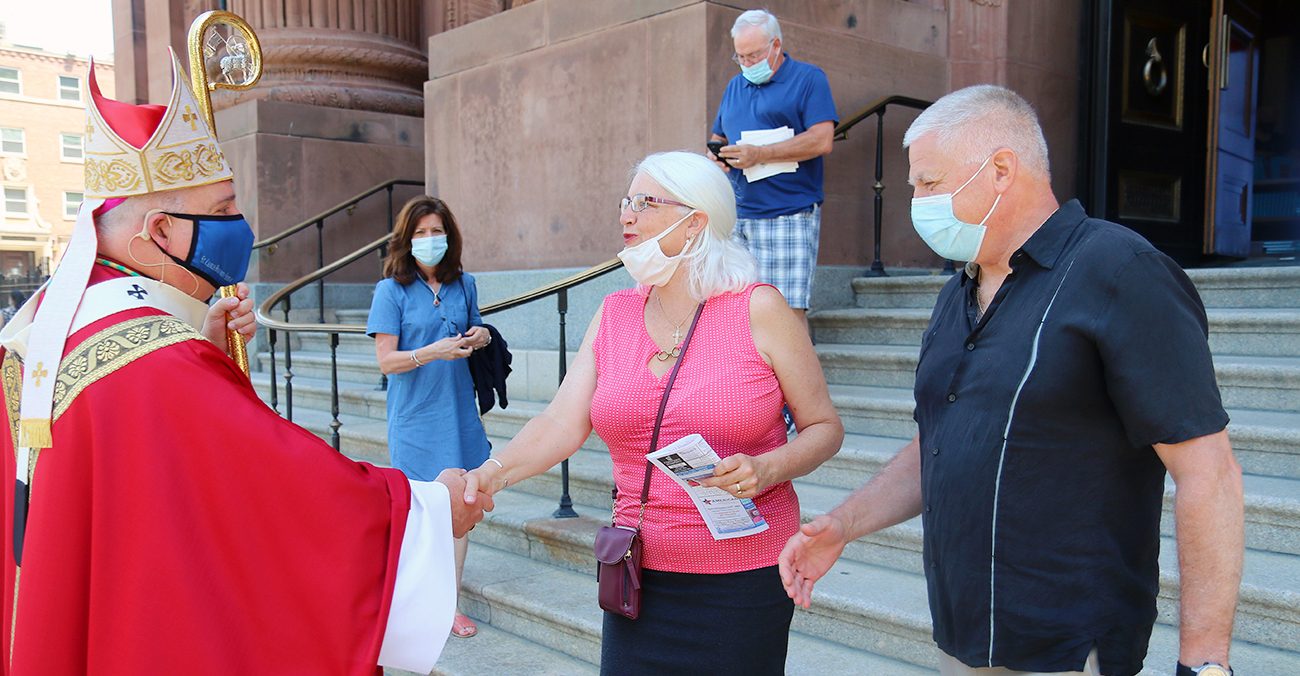Imploring Catholics of the Archdiocese of Philadelphia to return to the celebration of Mass in person, Archbishop Nelson J. Perez launched a major initiative for that purpose on Pentecost Sunday, May 23.
He described the initiative, titled “Nothing Compares to Being There,” in a letter to all Catholics (in English and in Spanish) and to participants at an 11 a.m. Mass on the Sunday feast day at the Cathedral Basilica of SS. Peter and Paul, Philadelphia.
[hotblock]
For more than a year Catholics, like everyone else, have had to abide by inconveniences such as not being with one another in person or easily seeing the faces of loved ones and friends due to facemasks, guidelines meant to protect one’s safety and that of others as the deadly COVID-19 pandemic rampaged across the globe.
Now the need for those practices to protect the common good, backed by government health regulations, are easing as more people become vaccinated against the coronavirus.
“Nothing Compares to Being There” marks the clearest sign yet, and at the top of the list for most Catholics, that the convenience of livestreamed Masses and the necessary practice of spiritual communion will soon give way to full participation in worship together as parish communities, face to face.
While the push for in-person attendance in parishes will begin in earnest in September, most restrictions on worship at Sunday and daily Masses including church capacity limits, social distancing and wearing facemasks are beginning to lift.
(Watch Archbishop Perez describe in his Pentecost Sunday homily some details of the initiative in the video below, by Sarah Webb:)
According to guidelines issued by the archdiocese last week, the dispensation from the obligation to attend Mass remains in effect, even as roped-off pews become a thing of the past.
Parishes in suburban Bucks, Chester, Delaware and Montgomery counties will see all restrictions lifted on Sunday, May 31. Parishes in the city of Philadelphia will follow on June 11.
The importance of drawing people back to the sacred liturgy comes from the words of consecration at Mass, in which Christ’s body is “given up for you,” and his blood “poured out for you.”
“As Catholics, we believe that the Eucharist is the Body and Blood of Christ,” Archbishop Perez wrote in his letter. “Such a precious gift deserves our reflection and appreciation. It’s not something we can experience virtually. Christ’s presence in the Eucharist is real and our personal presence is required to receive it.”
[hotblock2]
The archbishop noted that because of the COVID pandemic, the routines and habits including of Sunday worship changed for everyone. Initially no one could attend Mass except via livestream, and for the past several months people have been able to return to churches in person while observing precautions.
But attendance at most parish Masses has been at reduced capacity, in some cases dramatically so. That may reflect people’s fears of virus transmission among crowds, or perhaps an over-reliance on the convenience of livestreamed Masses.
Archbishop Perez admitted that Masses livestreamed by most of the archdiocese’s churches were “helpful” during the pandemic, but they should not be a substitute if an individual’s ongoing health precautions do not preclude personal attendance.
“Now, as the pandemic wanes and restrictions are lifting, I invite all the faithful of the archdiocese to make their way back to the in-person celebration of the Mass,” Archbishop Perez wrote.
The newly announced initiative, he added, “will involve the entire archdiocese and feature an invitation for everyone to recognize more profoundly the irreplaceable need to be in person for the celebration of Sunday Mass.”
During the summertime parish leaders across the archdiocese will invite their fellow parishioners back to Mass slowly and prepare a “heartfelt invitation” ahead of the concerted push for renewed attendance at Mass in September, according to the archbishop’s letter.
Until then Archbishop Perez encouraged everyone to “come home to the in-person celebration of Mass” because, as he wrote, “Nothing compares to being there.”
PREVIOUS: Archdiocesan parishes see guidelines to lift COVID restrictions
NEXT: Seniors stake their claims at new archdiocesan housing complex




Share this story